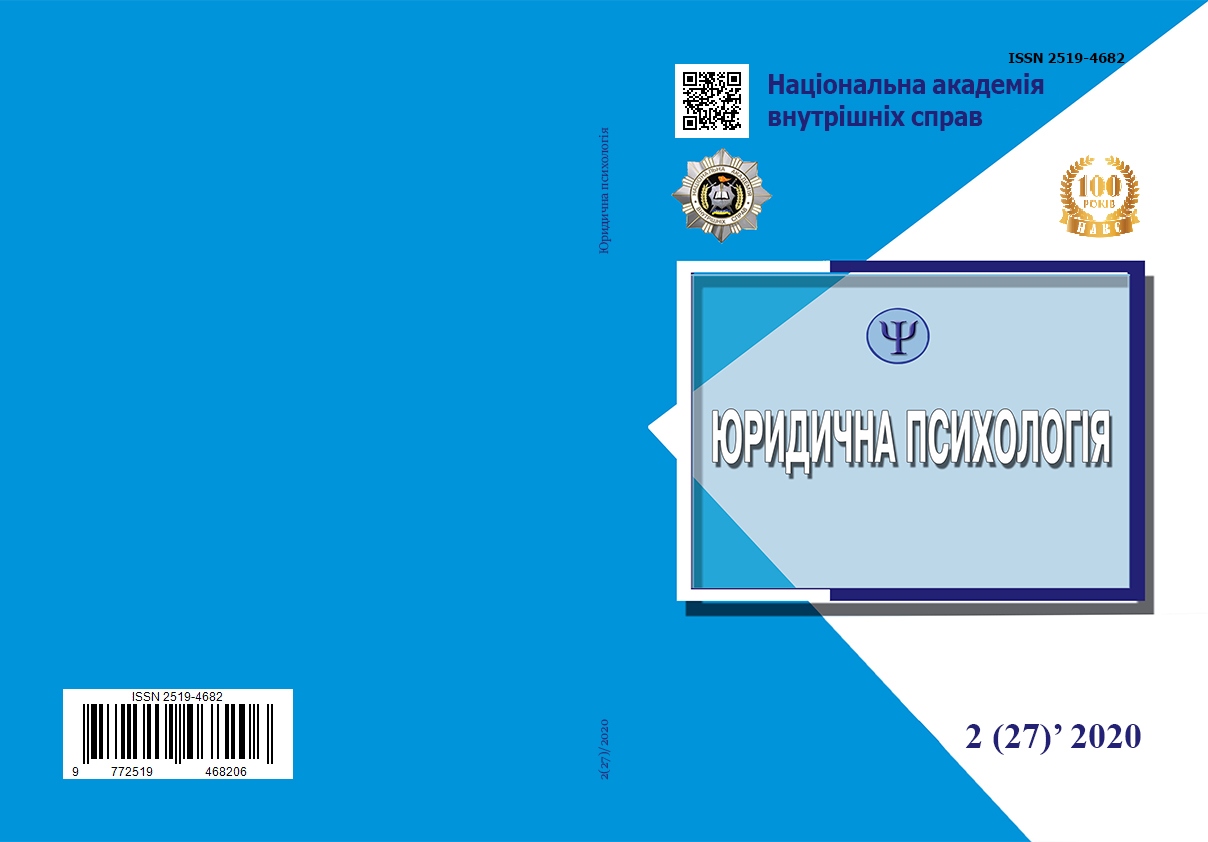Post-Traumatic Syndrome of Women Subjected to Violence
Abstract
The article is devoted to the analysis of the situation with gender equality in Ukraine. The causes of gender-based violence are investigated, and ways to overcome such a negative phenomenon are proposed. The term «post-traumatic syndrome», the possibility of minimizing its consequences are described. It is emphasized that violence against women has a number of complex causes, and the current crisis in the country, the silencing of the dilemma in society, the prevalence of gender stereotypes and the lack of awareness of women’s rights only exacerbate the situation. The problem of violence at the international level is recognized not only as a component of the problem of preventing violence against women, but also as a violation of women’s and human rights in general. Ukraine as a state can provide adequate legal protection to women victims, as there are all legal grounds for this. The purpose of the article is to find out the features of the post-traumatic syndrome of women who have experienced violence. Objectives: to describe the concept of post-traumatic syndrome; to understand the trends of violence against women in Ukrainian society; to find out possible ways to overcome or minimize negative phenomena. The research methodology is epistemological and ontological approaches to the subject of analysis. The scientific novelty manuscript is that: 1) the doctrine of women’s rights in modern society and the state received further scientific development; 2) the theoretical material on the issues of gender equality and gender violence was improved; 3) focus on the analysis of the effectiveness of public authorities, including law enforcement agencies in this area was made; 4) the need to form a new ideology of gender equality is emphasized. Conclusions. Training and educational activities are needed in order to implement in practice the principles of gender and protection of feminist rights and freedoms declared by law.
Keywords: women’s rights; ideology; post-traumatic syndrome; state bodies; gender equality; violence.
Downloads
References
Білан О. П. Основні кваліфікуючі ознаки правочинів, які порушують моральні засади суспільства. Форум Права. 2018. № 5. С. 6–12. doi: http://doi.org/10.5281/zenodo.2529910.
Попередження насильства щодо жінок та дівчат у м. Києві: модель особливості, перспективи : навч.-метод. посіб. / [Я. І. Бордіян, Т. В. Журавель, О. Л. Кулаковська та ін.] : Київ ; Калита, 2017. 98 с.
Bravo-Baumann H. Capitalisation of experiences on the contribution of livestock projects to gender issues: Working Document. Bern, Swiss Agency for Development and Cooperation, 2000.
Дахова І. І. Обмеження реалізації прав і свобод людини: конституційне регулювання та практика Європейського Суду з прав людини. Форум Права. 2018. № 4. С. 17–25. doi: http://doi.org/10.5281/zenodo.1467599.
Дрішлюк А. І. Норми моралі в системі джерел цивільного права України. Приватне право і підприємництво. 2014. Вип. 13. С. 35–38.
FAO. Gender: the key to sustainability and food security. SD Dimensions, May 1997. URL: http://www.fao.org/home/ru.
Федорець А., Чернега Є. Не хочу думати про це. Як переживати травматичні події. The village. 2020. URL: https://www.the-village.com.ua/village/knowledge/simple-words/296975-ne-hochu-dumati-pro-tse-yak-perezhivati-travmatichni-podiyi.
Конвенція Ради Європи про запобігання насильству щодо жінок і домашньому насильству та боротьбу з цими явищами : міжнар. док. від 11 трав. 2011 р. URL: https://ips.ligazakon.net/document/view/mu11251?an=2.
Козырев М. С. Историческое развитие идеологии. Вестник Костромского государственного университета. 2014. № 20 (1). С. 122–126.
Марущак О. А. Щодо сучасного розуміння та значення ідеології. Форум права. 2020. № 2. С. 92–101. doi: http://doi.org/10.5281/zenodo.3883817.
Михайличенко В. Ю. Понятие о травматизме. Травматический шок. Синдром длительного сдавливания : лекция. URL: http://ma.cfuv.ru/docs/203662/lecture5.pdf.
Насильство щодо жінок залишатиметься поширеним явищем, якщо боротьба з ним не стане для правоохоронних органів України пріоритетом. EUAM.Ukraine. 2017. URL: https://www.euam-ukraine.eu/ua/news/ opinion/violence-against-women-will-remain-widespread-if-ukrainian-law-enforcement-bodies-do-not-make-it-a-priority/.
ООН: одна з трьох жінок зазнає фізичного, сексуального насильства. Радіо Свобода. 2019. URL: https://www.radiosvoboda.org/a/news-oon-nasylstvo-proty-zhinok/30291028.html.
Савчин М. В. Сучасні тенденції конституціоналізму у контексті глобалізації та правового плюралізму : монографія. Ужгород : РІК-У, 2018. 440 с
Sex and gender: What is the difference? Medical News Today. 2018. URL: https://www.medicalnewstoday.com/articles/232363.
Як спілкуватися з людьми, які мають травматичний досвід. 2020. URL: https://suprun.doctor/zdorovya/yak-spilkuvatisya-z-lyudmi-yaki-mayut-travmatichnij-dosvid.html?=page1061.
Закликаємо ратифікувати Стамбульську конвенцію (Конвенцію Ради Європи про запобігання насильству щодо жінок і домашньому насильству та боротьбу з цими явищами). Gender culture center. 2020. URL: https://www.genderculturecentre.org/zaklikaiemo-ratifikuvati-stambulsk.
Про запобігання та протидію домашньому насильству : Закон України від 7 груд. 2017 р. № 2229-VIII. URL: https://zakon.rada.gov.ua/laws/show/2229-19#Text.
Зінсу О. Соціальні та юридично-психологічні аспекти домашнього насильства. Науковий вісник Національної академії внутрішніх справ. 2020. № 1. С. 79–87. doi: https://orcid.org/0000-0003-3801-6203.
Abstract views: 288 PDF Downloads: 685
- Authors reserve the right to authorship of their own work and transfer to the magazine the right of the first publication of this work under the terms of the Creative Commons Attribution License, which allows other persons to freely distribute published work with mandatory reference to authors of the original work and the first publication of an article in this magazine.
- Authors have the right to enter into separate additional agreements on non-exclusive dissemination of the work in the form in which it was published in the journal (for example, to post an article in the institution's repository or to publish as part of a monograph), provided that the link to the first publication of the work in this journal is maintained.
- The journal's policy allows and encourages the posting of articles by authors on the Internet (for example, in electronic storehouses of institutions or on personal websites), both before the submission of this manuscript to the editorial office and during its editorial processing, as this contributes to the creation of a productive scientific discussion and positively affects the efficiency and dynamics of citing the published work.




